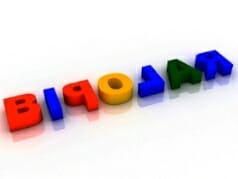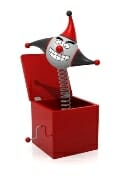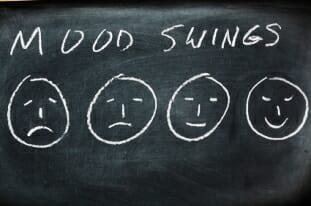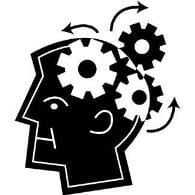What are genuine bipolar symptoms? So much information about the symptoms of bipolar disorder (manic depressive illness) is confusing, misleading, or contradictory.

Symptoms of bipolar often get misinterpreted, leaving the real problems of bipolar disorder unaddressed.
There is still a shortage of accurate and reliable information about bipolar disorder symptoms, despite much interest.
Traditionally bipolar disorder symptoms were framed in terms of mood swings. However, today bipolar disorder symptoms are often framed in much broader terms.1
One of the biggest difficulties is in distinguishing bipolar from major depression.
In addition to the confusion between bipolar and severe depression, another common misdiagnosis is to mistake borderline personality disorder for bipolar disorder.
Also, bipolar symptoms are easy to confuse with other disorders such as ADHD, or physical problems such as thyroid disorder.
Reminder
Bipolar symptoms are more than feelings. They must result in behavior with substantial negative consequences.
Discover the real symptoms of bipolar disorder. Don’t be apart of the misinformed crowd who confuses bipolar with other illnesses and personality problems.
In some ways “bipolar” was easier to understand back when it was commonly known as “manic-depressive illness”.
This is because bipolar is all about mood swings. These are mood changes that are more extreme and pronounced then the usual ups and downs we all experience from day to day.
Symptoms of bipolar disorder: from National Institute of Mental Health (NIMH)
Bipolar depression symptoms
Depression involves feelings of sadness and emptiness or a loss of pleasure or interest in things. These feelings last most of the day, on most days for at least 2 weeks. These symptoms are severe enough to negatively impact a person’s ability to work, participate in and enjoy relationships, overall be able to function and perform everyday life activities.
Learn about medication for treating bipolar depression symptoms

Bipolar depression symptoms include:
1. Feeling of sadness or emptiness.
2. Losing interest or pleasure in one’s usual enjoyments.
3. Changes in appetite (up OR down), and/or substantial and unplanned loss of weigh or weight gain.
4. Insomnia.
5. Excessive tiredness or sleepiness, and/or lack of energy.
6. Restlessness and agitation.
7. Reduced sex drive.
8. Lack of motivation.
9. Feeing worthless.
10. Feeling guilty about things you are not responsible for.
11. Indecision.
12. “Fuzzy” thinking, problems concentrating, or memory loss.
13. Thoughts of self harm or suicide.
14. Hallucinations.
15. Delusions.
Bipolar symptoms of mania
The word “manic” is often thrown around quite casually, but for genuine bipolar symptoms, mania must have some very definite characteristics. Specifically, to meet a diagnosis of mania, the mood changes must last for at least a week, or be so severe that hospitalization is required. These bipolar disorder symptoms cause significant disturbance to work, relationships and daily life.
Symptoms of bipolar mania include:

1. Exaggerated high opinion of oneself.
2. Beliefs that one has great talents or gifts that extend beyond reality.
3. Hallucinations.
4. Reduced need for sleep.
5. Talking more than usual.
6. Pressure to keep talking.
7. Skipping from one idea to the next so there is a fragmented flow of thought.
8. Racing thoughts.
9. Easily distracted but some short periods of very focused attention.
10. Feeling restless and agitated, for example finding it hard to sit still.
11. Increase in goal directed activities, related to social, work, school, or sexual pursuits.
12. Excessive engagement in pleasurable activities without thought to their distressing consequences, such as big spending sprees, gambling, sexual indiscretions, and/or poor business investments.
Symptoms of hypomania

Hypomania is a milder form of mania, and may result in a diagnosis of Bipolar Type II or “soft” bipolar.
The symptoms of bipolar mania and hypomania are the same – what is different is the DURATION and INTENSITY of the bipolar symptoms.
In hypomania, the symptoms must last for at least 4 days and are not serious enough to require hospitalization.
See this description of major bipolar disorder symptoms from a leading bipolar research institute.
And remember, bipolar symptoms are all about mood swings – there must have been BOTH depression AND mania/hypomania, although there are cases of Bipolar I Disorder where the person only experiences mania (and not hypomania or depression). In Bipolar I, many people do go through the depressive episodes either before or after a manic or hypomanic episode, but there are cases of people who do not experience depression. In this case, the mood “swings” is characterized by the person’s “normal” or “typical” mood state in between episodes followed by the shift or “swing” to a manic episode.
SEXUAL ISSUES are amongst the most common, but least discussed symptoms possibly due to the shame/embarrassment caused by this symptom, as well as the potential for it to be harmful or dangerous to the Bipolar person and others:
“A very common symptom in maniacal conditions is erotic excitement. This varies from mere coquetry, an extended application of the command “love one another”, an undue attention to the opposite sex, up to extreme salacity, when the mind is wholly occupied by urgent sexual appetite, and all restraint abandoned.” – DANIEL HACK TUKE (1827-1895)
Sometimes we need to consider outward manifestation of bipolar as well as a sufferer’s own subjective, internal states.
Regardless of what someone may report their mental and emotional state to be, valuable insight into their symptoms can be gained if you know some basic information about Bipolar Behavior.
HINT: PLEASE do read about this and do not base your image of bipolar symptoms on what you have read about Charlie Sheen.)
Cognitive bipolar symptoms

This is a tricky area because sometimes cognitive problems such as “fuzzy thinking” or memory loss are due to the side effects of bipolar medications.
Also, many people with bipolar disorder are very gifted and often believe that mania, or at least hypomania, enhances their intellectual or cognitive abilities.
However, there is also evidence to suggest that with bipolar, cognitive problems can be a pretty typical symptom.
This may be anything from being easily distracted, to mental fogginess, memory problems, or becoming easily confused.
There is a difference between symptoms that MAY occur in bipolar and the symptoms that are specified in the criteria for the diagnosis. Foggy thinking alone is not a reason to suspect bipolar – grandiosity and racing thoughts are.
The evidence about cognitive bipolar symptoms can be conflicting. For example, one study observed poor performance in all groups of bipolar people when compared to “healthy” subjects with tasks such as verbal recall and executive functioning.2
Other research has shown that once stable, folks with bipolar do not show cognitive impairment.
Also, rather than causing harmful cognitive effects, some bipolar medications such as lithium have neuro-protective properties and can help the brain regenerate grey matter and protect against problems such as memory loss.
Physical effects and symptoms of bipolar
Sometimes bipolar symptoms are caused, aggravated, or exacerbated by other underlying medical conditions such as thyroid problems.
Also, people with bipolar disorder are twice as likely to die prematurely from medical conditions such as heart disease and stroke than are members of the general population.
Even scarier, they are three times more likely to develop diabetes, and some diabetes symptoms can look like bipolar symptoms.
Manic depression symptoms or bipolar?
Is there ANY difference between the symptoms of manic depression and those of bipolar?
Generally we are simply told that “bipolar disorder” is the new name for what we used to call “manic depression” or “manic-depressive illness”.
However, some experts do see a difference in the precise definition of these terms. In other words, for some experts “bipolar” is not just a replacement, synonym or updated
term. For these experts “bipolar disorder” does carry a different meaning.
For example, to some, “manic depressive illness” is a synonym only for Bipolar Type 1 and Bipolar Type 2, but does not cover
the full bipolar disorder spectrum. Further, some prefer “bipolar disorder” to “manic depression” because manic depression sounds so black and white,
allowing for either a distinct episode of mania or a distinct episode of depression. However, the illness can also include mixed episodes and a range of other, more subtle, nuances.
References:
1https://www.mayoclinic.org/diseases-conditions/bipolar-disorder/symptoms-causes/syc-20355955
2https://www.nimh.nih.gov/health/topics/bipolar-disorder/index.shtml
 Medically reviewed by
Medically reviewed by
4 Comments
Very interesting and informative, and truthful too. Should be read by both clinicians and the general public alike.
I am very curious about how bipolar relates to diabetes. Is the “three times more likely to develop diabetes” talking only about type 2 diabetes, or type 1 as well? I was also curious about what diabetes symptoms look like bipolar.
Great article, thank you for writing it!
I am being told that my boyfriend’s feelings of depression and anxiety and his “fire” going out are because of our relationship. He feels that moving on and just being friends will help him to solve his problems. He also thinks his self destructive behavior, such as drinking and smoking pot nightly is related to the relationship and not his mental disorder. He will not take medication. It makes him feel like a zombie. Two months ago I was the best thing that ever happened to him and he spoke of marriage. Then, the week after Valentine’s day, he just couldn’t do it anymore. The last six years looked good on the surface but deep down it just wasn’t right. He lost his fire and wasn’t feeling excited about anything and it was bc of our relationship. He has spoken to me since we broke up and tells me how much he misses me but his anxiety attacks haven’t been happening as frequently so it must be bc we are no longer together. Prior to the breakup, he would call me to come over to hold him so the anxiety would go away. This was bc I made him feel safe and like “home”. Our entire relationship has been, one month I am the best thing since apple pie and the next month, I am judgmental and not free enough. Is this the bipolar disorder or is he just a huge jerk?
How can you call it if you have all the symptoms of Bipolar depression except #14 and 15, but you have # 5,6,7,8,9, of the symptoms of Bipolar symptoms of mania?